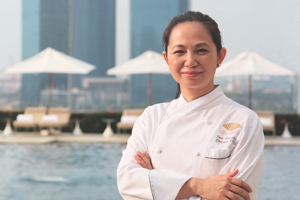Toni Robertson, who recently took over as executive chef at Mandarin Oriental, Singapore, always knew she would become a chef. After serving in the U.S. Air Force, Robertson worked in hotels worldwide ranging from Four Seasons Beverly Hills to South Africa’s Palace Hotel of the Lost City, so she has a wide-ranging perspective on kitchen design.
HOTELS asked Robertson about her kitchen wish list as well her predictions for the hotel kitchen of the future.
HOTELS: What kitchen feature is at the top of your wish list right now?

Toni Robertson: I would love to have a state-of-the-art expediting station that incorporates the latest technology and allows for variable hot temperatures, has a lower cooling compartment for garnishes and a burner to properly finish sauces. The ability to transition from the grill to the table can be the difference between a great dish and one that is lost because of the ability to assemble and finish it properly. In a world-class restaurant, a high-quality expediting station is not a luxury — it is a necessity.
The other piece of equipment that I really like is the modern tableside trolley. I have long been a proponent of tableside cooking, which is actually an Asian concept — not European as often thought. The process of preparing, cooking or assembling dishes tableside not only lends a touch of theater, but it allows us to bring a more personal and intimate aspect to the dining experience. I think this is going to be an ongoing trend over the next few years.
HOTELS: What is the most unconventional hotel kitchen you have worked in, and what are one or two specific features that made it memorable?
Robertson: I have had the opportunity to be involved in a number of kitchen designs and redesigns, and the most unique was at the Sonoma Mission Inn and Spa in Sonoma, California. This is the heart of California’s wine country and very beautiful and rustic. We were the top-rated spa resort in the United States at the time with a focus on healthy, lifestyle cuisine using artisanal and local farm-grown ingredients.
We renovated Santé, our upscale restaurant, and essentially brought much of the cooking out front, behind a counter, so it became part of the dining experience. I had a tandoori oven installed behind the counter so we could cook flatbreads and roasted whole fish as guests watched, fascinated by the process. The entire counter was designed to invite the guest into the cooking experience. It was very visual, but at the same time, it was also very efficient. The dining area and cooking area were essentially one in the same. It was a huge success and worked not only because of the cuisine style, but also because of its minimal design concept.
HOTELS: How much have you seen hotel kitchens evolve during your career?
Robertson: Large, cavernous kitchens with their seemingly endless rows of stainless steel and multiple specialty stations are long gone. Today there is a significantly greater appreciation of the costs associated with every aspect of running a restaurant — from the amount of real estate it takes up to the number of cooks and waitstaff required to do the job to the supporting operation such as cleaning, maintenance and utility costs. Every executive chef will tell you that they need to be half culinary artist, half financial wizard.
Today’s professional kitchen is much more efficient, operating in a much smaller footprint, with a significantly higher level of efficiency and production. We even see shared kitchen space between two restaurants. Today’s kitchen has to be compact and organized to allow cooks to multi-task and be more productive. There has to be a logical flow and fluid movement to the space that is both efficient and effective. It also has to have the most technologically advanced equipment such as induction stoves, combi units and variable controls.
HOTELS: If you could invent anything for the hotel kitchen of the future, what would it be?
Robertson: I would love to see kitchens go green in the sense that we could do a much better job disposing of waste. I would like to develop a high-tech composter for organic material that could be installed right in the kitchen as well as commercial machines to better compact non-organic materials.
I see the future kitchen as more efficient, green, cleaner and, most importantly, quieter! Most chefs will tell you the constant noise and din of a kitchen, day after day, eventually takes its toll on their hearing. I think now is the right time to develop and introduce more high-tech acoustical equipment and solutions into kitchens in an effort to reduce and mitigate noise levels.
